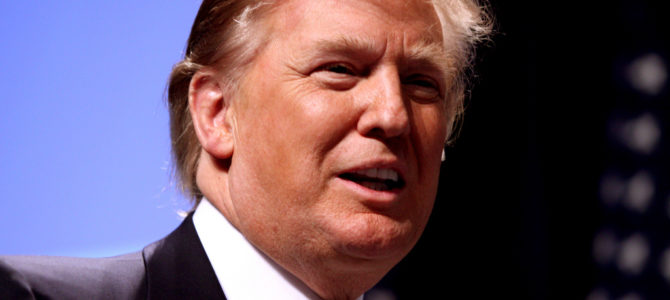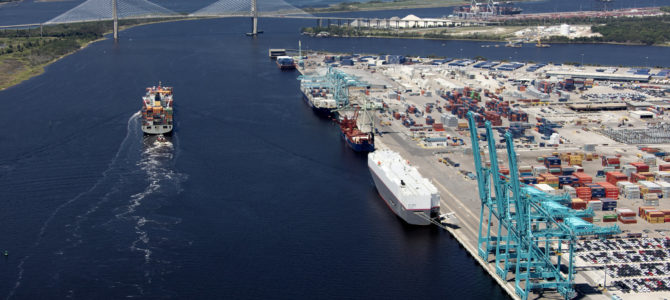
President Trump’s announcement that he plans to impose tariffs of 25 percent and 10 percent on steel and aluminum, respectively, caught markets and business leaders off guard. Journalists have paid a great deal of attention to its economic impacts, ranging from a short-term drop in stock prices for firms that use steel in manufacturing to job losses and retaliatory trade restrictions from partners.
Each of these is reason enough to reject Trump’s tariffs as unwise, but they are also emblematic of a graver danger. Beyond simply being bad policy, Trump’s unilateral actions on steel and aluminum tariffs epitomize the dangers of the longstanding and, regrettably, bipartisan trend toward excessive concentration of power in the executive branch.
The president has justified his actions by claiming he is acting in the interests of American workers and national-security interests by preserving jobs in steel and aluminum manufacturing, while preserving a domestically produced supply of each metal in the case of a geopolitical crisis. On the former count he is shortsighted; on the latter he is either deeply misguided or cynically creating a means by which he can exercise a power that rightfully belongs to Congress.
Steelworkers and steel-town residents are optimistic about the tariffs, hoping they will bring back jobs and revive manufacturing communities. However, available evidence suggests that automation and improvements in factory technology, would have depressed employment at American steel mills with or without the concurrent phenomenon of globalization. There is no tariff that can un-ring that bell. Even if we were to grant that tariffs might help some American steel manufacturers, theirs is a narrow interest compared to the wide swath of industries — which includes sectors as varied as beer, automobiles, construction and energy — that would face higher production costs and slower job growth as result of higher prices for raw materials, to say nothing of the millions of American consumers to whom the tariffs could be passed on through higher prices for finished goods. Given these ripple effects, benefits from the tariffs are unlikely to accrue to blue-collar Americans.
The direct economic impact of these tariffs, however, is small next to their implications for international trade writ large. It is here where the administration’s rhetoric begins to ring truly hollow: Trump and his advisers have cloaked their protectionism in national-security terms as necessary to counter Chinese domination of the market and ensure America has a ready supply of critical raw materials, but the effects of their proposals would in fact weaken America’s position in the world.
Despite its massive presence in the global market, China only just cracks the top five of steel importers to the United States. The countries ahead of China — Canada, South Korea, Mexico, and Brazil — are all U.S. allies or important strategic partners, as are Japan and the European Union, both of whom have had intensely negative reactions to Trump’s proposals. Antagonizing allies and instigating tit-for-tat restrictions across the international trade system simply to create a minor irritation for Chinese steelmakers and create a small boost in domestic production is, in national-security terms, a poor trade-off.
The most insidious part of this story is also the one that has gotten the least attention. Trump has casually seized for himself a power — the ability to levy tariffs — that traditionally and rightfully belongs to Congress. This legislative prerogative was, like so many, passed to the executive branch by means of euphemism and bureaucratic interpretation, with an odd wrinkle: in this case, Congress itself played an active role in abdicating its responsibility.
Section 232 of the ironically titled Trade Expansion Act of 1962 granted the president the right to impose tariffs in the case of a national security threat. This exemption was no doubt intended for a scenario of large-scale conflict in which the U.S. would have no choice but to produce its own steel. The law, however, makes no such specifications, and national security threats are like tans: anyone can make it look like they have one, no matter how real it is.
Thus did the Commerce Department conclude that a status quo in which the United States imports one third of its steel, mostly from its allies, constituted a national security threat large enough to justify the president in imposing tax increases by fiat. The Constitution explicitly grants the power to levy taxes, including tariffs, to guard against corruption and arbitrary government, and both of these are present in Trump’s tariffs.
Trump has cloaked his tariff proposals in populist rhetoric, but they represent cronyism of the highest order, providing concentrated benefits to narrow political interests while imposing much larger costs on the general public. It would be difficult for such a proposal to pass muster in Congress, whose members represent Americans with a vast array of contradicting interests.
Setting factions against each other to make legislation without broad appeal difficult to pass was a specific purpose of Congress’s design. The President, by comparison, is only one man, who at any given time may have multiple quacks and rent-seekers whispering sweet, economically illiterate nothings in his ear. What matters here is not whether Donald Trump is more or less virtuous than your average congressman, but that should he go into the business of picking winners and losers, there will be no one to check his worst impulses.
In addition to being vulnerable to corruption, government by executive order has another shortcoming: it is arbitrary, and therefore unpredictable. Under Barack Obama’s administration, businesses and investors noted how the uncertain regulatory environment created by his authoritarian governing style made it difficult for them to commit resources for hiring and product innovation. It is difficult to plan for the future when one cannot be sure would interrupt established practices and alter the cost of doing business.
If Trump establishes a precedent whereby the chief executive can assess tariffs without warning or legislative deliberation, then regulatory lawlessness will have reached new heights. Conservatives rightly recognized this as not only irresponsible, but dangerous, when it was practiced by Barack Obama. It is no less dangerous now that it is employed by Donald Trump, who over the years has shown himself to be endlessly changeable, impulsive, and generous in his estimation of his own power.
The American project is a direct and forceful rejection of the exact sort of arbitrary government that Trump’s tariffs represent. The accumulation of power in the executive branch, ultimately tilts policy in the direction of favored players and interests rather than the common good, and deprives the people of their means to change it. Conservatives generally have a better grasp on this truth than our liberal friends, but too many of us have been willing to turn a blind eye to it for partisan reasons.
There is no economic outcome or political maneuver that is worth further degrading the separation of powers, which the previous administration already left on its knees. If we are to truly protect the future of this nation by strengthening and preserving our constitutional order, Republican policy goals cannot take precedence over republican principles.









